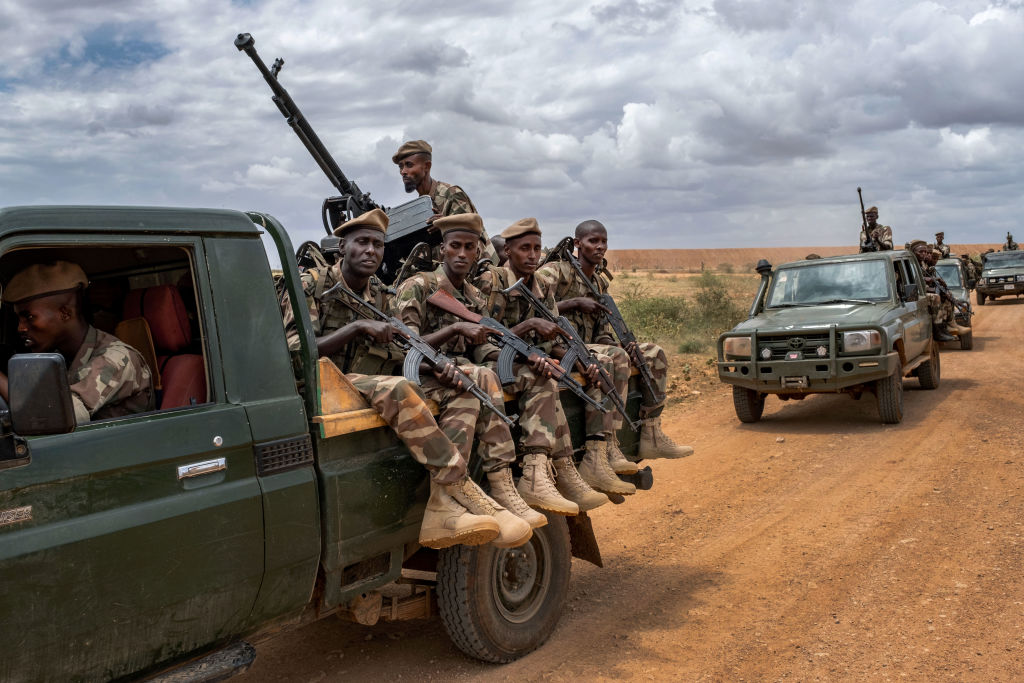Terrorists have killed more than 150,000 people across Africa over the past decade, with most of that violence taking place in the Sahel, Somalia, and the Lake Chad basin, according to new research by the Africa Center for Strategic Studies.
Since 2016, when Somalia was the focal point for terrorist violence, the number of attacks, terrorist groups and regions affected have grown. Many of those groups claim allegiance to al-Qaida or the Islamic State group (IS).
The death count escalated rapidly after coups in Burkina Faso, Mali and Niger. Those coups were driven to some degree by claims that the military would succeed at defeating terrorists after democratically elected governments had failed to do so.
So far, however, the situation in all three countries only has gotten worse. Burkina Faso now leads the world in terrorism-related deaths, followed closely by its Sahelian neighbors. In the past year, the Sahel’s 10,685 terrorism-related deaths have accounted for nearly half of all such deaths across the continent.
Violence also is bleeding over into northern Benin and Togo and into northwestern Nigeria near the border with Niger.
“The pace and scale of violence in the Sahel is likely even higher than reported, given that the military juntas that seized power in Mali, Burkina Faso, and Niger have restricted media access within the region, which is the main source of conflict data,” Africa Center researchers wrote in their report.
Analysts estimate that terrorists control about 40% of Burkina Faso’s territory. The ruling junta has recruited thousands of civilians into lightly armed and poorly trained Volunteers for the Defense of the Homeland militias. Militia members have been accused of killings and other human rights abuses against civilians, particularly members of the Fulani ethnic group.
Burkinabe and Malian junta leaders have recruited mercenaries with Russia’s Africa Corps — and the private military contractor Wagner Group before that — to help their soldiers fight Jama’at Nusrat al-Islam wal-Muslimin (JNIM) and other groups.
As Russian mercenaries joined the region, Burkinabe and Malian troops increased attacks on civilians. Over the past four years, such attacks have killed more than 6,000 people, which is more than the 5,708 people who died in terrorist attacks during that same period, according to the Africa Center.
Among those combined military-mercenary attacks was the 2022 assault on a market in the central Malian community of Moura, where Russian and Malian forces killed more than 300 men, primarily Fulanis.
Al-Qaida-affiliated JNIM accounts for 83% of terrorism-related deaths in the Sahel and recently has gained access to drones, increasing its potential for attacks on military and civilian targets. Other al Qaida-affiliated groups, such as al-Shabaab in Somalia, remain the most persistent threats in their own regions, although, like JNIM, they have competition from groups aligned with IS.
The Somali National Army’s two-year offensive against al-Shabaab has provoked an increase in attacks that has cost the military territory and doubled fatalities between 2022 and 2025 to more than 6,200 people.
Connections with the Houthis in Yemen have allowed terrorists to increase their use of drones against Somali troops.
In the Lake Chad Basin shared by Cameroon, Chad, Niger and Nigeria, Boko Haram’s violence has dropped by 50% from its peak in 2015. Despite that decline, terrorism-related deaths in the Lake Chad Basin rose 7% over the past year due to attacks by Boko Haram and its rival, Islamic State West Africa Province (ISWAP).
Nigeria has ramped up its military operations in northeastern Borno State. Airstrikes this year have killed nearly 600 terrorists and destroyed hundreds of vehicles and other equipment, according to Nigerian military figures.
In response, terrorists have increased their own activities in the region, using drones to attack military bases, police stations and civilian targets.
Borno State Gov. Babagana Zulum told the BBC that terrorists are attacking and kidnapping people in many communities almost daily. He told Nigerian security officials that Borno is losing ground against the extremists.
According to security experts, Nigerian forces are being drawn away from the Lake Chad region by the demand to stifle banditry in the northwest. The fight against Lake Chad extremists got harder after Niger withdrew from the Multinational Joint Task Force, according to experts.
“No matter how our military weaken them, they can always regroup and will remain a threat,” analyst Hamisu Sani told the BBC, speaking about Boko Haram and ISWAP.

